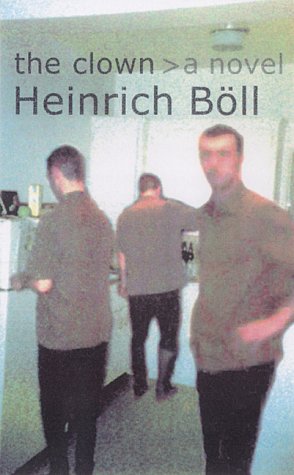

The Clown
M**D
Excellent edition of this Böll classic.
Bought this 2nd-hand through marketplace (not the illustrated edition I think). Was in excellent condition and fantastic value for money.Have read this before in German when my German was at a much lower level, and I found it quite difficult. I've always wanted to read a translation to get a better idea of it, then go back to the German again.Was pleased to find such a good quality edition of the translation so cheaply.Slightly surprised by the American spellings, given that it was printed in the UK, but that's hardly a problem.EDIT: My edition is published by Marion Boyars, London, looks like a 1995 re-print. Really nice edition. Bought from Awesome Books, via Amazon Marketplace. A very satisfactory purchase.
M**R
Second-hand book - as described.
Book is for discussion at book group meeting. Abs fine for that.
D**E
A brilliant book from German writer Heinrich Boll with close cropped ...
A brilliant book from German writer Heinrich Boll with close cropped narrative and wonderful interior monologues from a clown in Germany and his views of misanthropy and sadness in those around him. A wonderful read that finely and necessarily and by far outshines anything remotely described as modern fiction of today which was of course written yesterday.
J**E
Book came on time. However my copy's binding in ...
Book came on time. However my copy's binding in the last third of the book resulted in many words missing.
P**L
The Clown by Heinrich Boell
The book was in good condition and it is a fine read.
D**Z
Four Stars
Fine
R**N
The Tears Of A Clown
This book captures magnificently the feeling of being down and out and rootless. It is set specifically in post World War II Germany and describes well what surely were the feelings of many. But the sense of loss, alienation, lack of love, religious doubt set forth in the book go much deeper than that.The book is told first person by its hero, a clown, Hans Schneir, who has enjoyed some success but has fallen to the state of pennilessness and drink after abandonment by his love, Marie, and an injury. The stuff of which romantic novels are made but the stuff of realism and symbolism too. Hans, from a wealthy but emotionally impoverished family, establishes a romantic liaison with Marie, a young promising student who abandons her studies for him. She in turn ultimately leaves him based in part on her attachment to Catholicism. Schnier is an unbeliever but a"monogamous" unbeliever and can't adjust himself to the loss of Marie. He looks to friends, family, and others for comfort but finds none.Schneir says near the end of the book in an important passage "If our era deserves a name it would have to be called the era of prostitution. People are being accustomed to the vocabulary of whores." This theme is pervasive to the book together with hints about a way out. For example, in the course of a pivotal discussion between Schneir and his father Schneir alludes to and rejects the possibility that he must "lose [his] soul -- be totally empty, then I can afford to have one again."The book is full of flashbacks from the narrator's part interspersed with his reflections on his current activities and situation. His thought centers on his own spiritual and emotional poverty, on the loss of Marie, his ambivalence towards religion, and the attempted change among Germans following their defeat. In some ways, the book and its end remind me of Schubert's great song cycle, "Winterreise". The translation seems to me not of the best but it serves to convey the book. This novel is thoughtful, moving and worth reading.Robin Friedman
R**Y
The clown who collects moments
Böll's sensitive, reflective novella explores the predicament of Hans, a professional clown, who has never been understood or appreciated by his conservative family and has been deserted by his only love, Marie. Following an injury, he has now been struck off by his agent and fears destitution. Having returned to Bonn he spends a day calling up everyone whom he hopes may help him. At the same time he mulls over what went wrong between him and Marie. This intense time of reflections and flashbacks reveals much about the attitudes of those who pride money, status and religion (including his well-to-do family) - their self-righteousness and inability to relate to someone with a different set of values.This is less a love story than a critique of the attitudes of Roman Catholicism and right-wing society. Hans and Marie 'lived in sin' because Hans wouldn't sign a written statement about bringing up their children as Catholics; his brother is too busy with religious observances to help, and his mother is more emotional about the fate of her parquet flooring than the lives and happiness of her children.Hans has lost two women whom he loved - Marie, and his sister. One woman is still there for him - Monika Silvs - but in his morbid mood will he even give Monika a moment's thought?This is a novella that will demand from you a degree of patience and pathos; my rusty A-Level German was a little stretched, but Böll's graceful writing style rewards the effort.
Trustpilot
1 month ago
1 month ago